Validation engineers are fundamental in ensuring that products meet quality and efficiency standards before they reach the market. They ensure that products perform safely and as intended, which is crucial in industries like pharmaceuticals, biotechnology, and manufacturing.
Skills required for a validation engineer include a strong understanding of regulatory standards, proficiency in documentation and data analysis, and the ability to design and execute validation tests effectively.
Candidates can write these abilities in their resumes, but you can’t verify them without on-the-job Validation Engineer skill tests.
In this post, we will explore 9 essential Validation Engineer skills, 11 secondary skills and how to assess them so you can make informed hiring decisions.
Table of contents
9 fundamental Validation Engineer skills and traits
The best skills for Validation Engineers include Analytical Thinking, Attention to Detail, Technical Writing, Problem-Solving, Knowledge of Regulations, Data Analysis, Software Proficiency, Project Management and Risk Assessment.
Let’s dive into the details by examining the 9 essential skills of a Validation Engineer.
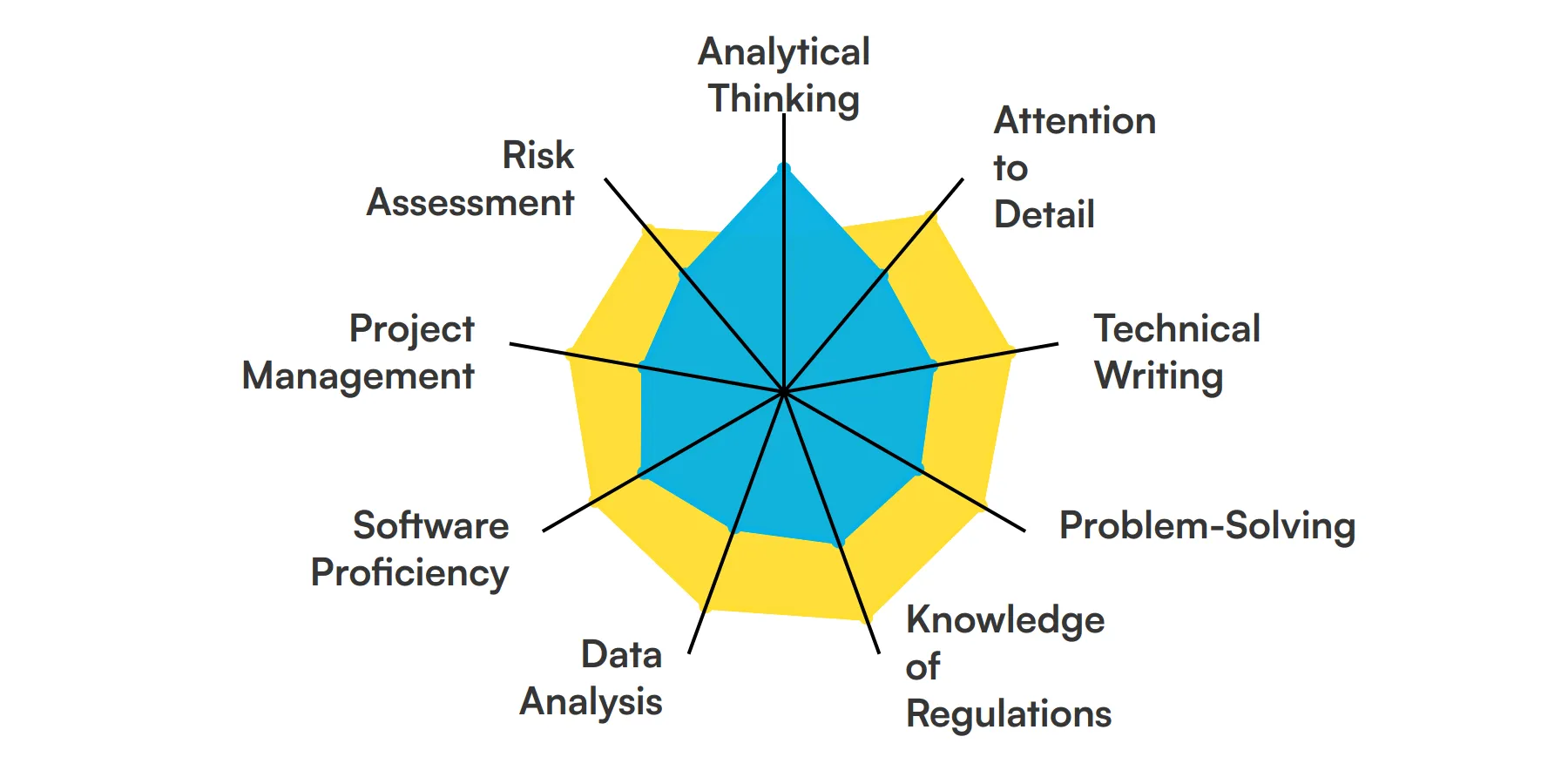
Analytical Thinking
A validation engineer must possess strong analytical thinking skills to dissect complex systems and identify potential issues. This skill helps in understanding the intricacies of the system and ensures that all components function as intended.
Check out our guide for a comprehensive list of interview questions.
Attention to Detail
Attention to detail is crucial for a validation engineer to catch even the smallest discrepancies in system performance. This skill ensures that all aspects of the system are thoroughly checked and validated, preventing future failures.
Technical Writing
Technical writing skills are necessary for documenting validation processes, test results, and compliance reports. Clear and concise documentation helps in maintaining records and communicating findings to other team members and stakeholders.
For more insights, check out our guide to writing a Technical Writer Job Description.
Problem-Solving
Problem-solving skills enable a validation engineer to troubleshoot issues that arise during the validation process. This involves identifying the root cause of problems and developing effective solutions to ensure system reliability.
Knowledge of Regulations
A validation engineer must be well-versed in industry regulations and standards. This knowledge ensures that the systems and processes comply with legal and safety requirements, which is critical for product approval and market entry.
Data Analysis
Data analysis skills are essential for interpreting test results and making informed decisions. A validation engineer uses this skill to analyze performance data, identify trends, and validate the effectiveness of the system.
Software Proficiency
Proficiency in validation software tools is necessary for conducting tests and simulations. A validation engineer uses these tools to automate testing processes, analyze results, and ensure the accuracy of the validation process.
Check out our guide for a comprehensive list of interview questions.
Project Management
Project management skills help a validation engineer to plan, execute, and monitor validation activities. This includes coordinating with different teams, managing timelines, and ensuring that validation tasks are completed on schedule.
Risk Assessment
Risk assessment skills are important for identifying potential risks in the system and developing mitigation strategies. A validation engineer uses this skill to ensure that all possible failure modes are considered and addressed.
11 secondary Validation Engineer skills and traits
The best skills for Validation Engineers include Communication, Team Collaboration, Time Management, Critical Thinking, Adaptability, Programming Knowledge, Statistical Analysis, Hardware Knowledge, Quality Assurance, Documentation and Customer Focus.
Let’s dive into the details by examining the 11 secondary skills of a Validation Engineer.
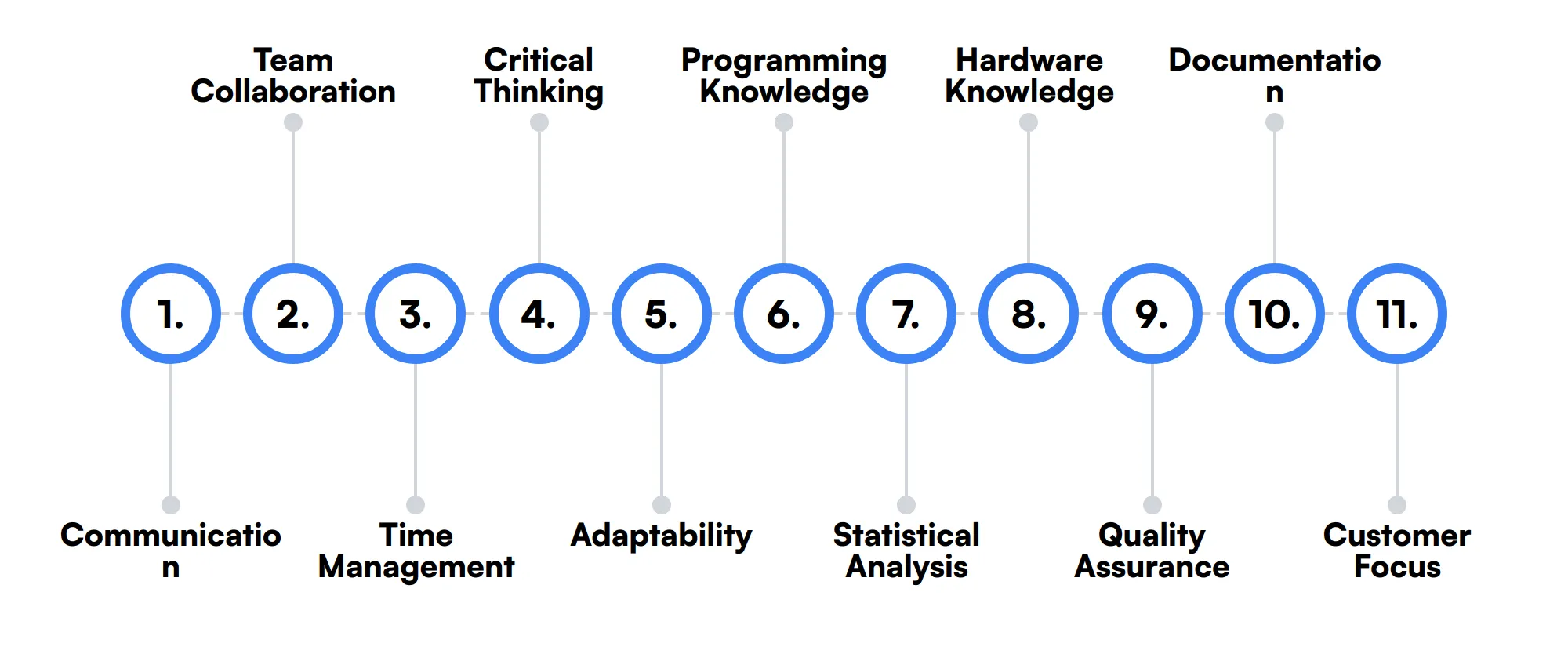
Communication
Effective communication skills are important for a validation engineer to convey technical information to non-technical stakeholders. This ensures that everyone involved understands the validation process and its outcomes.
Team Collaboration
Collaboration skills are necessary for working with cross-functional teams. A validation engineer often collaborates with design, development, and quality assurance teams to ensure that all aspects of the system are validated.
Time Management
Time management skills help a validation engineer to prioritize tasks and manage deadlines. This ensures that validation activities are completed efficiently and within the project timeline.
Critical Thinking
Critical thinking skills enable a validation engineer to evaluate complex problems and make sound decisions. This skill is important for assessing the validity of test results and determining the best course of action.
Adaptability
Adaptability is important for a validation engineer to handle changes in project requirements or unexpected issues. This skill ensures that the engineer can quickly adjust to new situations and continue the validation process without significant delays.
Programming Knowledge
Basic programming knowledge can be beneficial for a validation engineer, especially when working with automated testing tools. This skill helps in customizing tests and analyzing results more effectively.
Statistical Analysis
Understanding statistical analysis is useful for interpreting test data and validating results. A validation engineer uses this skill to ensure that the data supports the system's performance and reliability.
Hardware Knowledge
Knowledge of hardware components is important for a validation engineer working with physical systems. This skill helps in understanding how different components interact and ensuring that they function correctly together.
Quality Assurance
Quality assurance skills are important for ensuring that the system meets all quality standards. A validation engineer uses this skill to verify that the system performs as expected and meets customer requirements.
Documentation
Strong documentation skills are necessary for maintaining accurate records of the validation process. This includes writing detailed reports, creating test plans, and keeping track of any changes made during validation.
Customer Focus
A customer-focused approach helps a validation engineer to understand and meet the needs of the end-users. This skill ensures that the validated system provides a satisfactory user experience and meets customer expectations.
How to assess Validation Engineer skills and traits
Validation Engineers play a critical role in ensuring that products meet all necessary standards and function as intended. Assessing their skills effectively is key to hiring the right talent for your team.
While a resume might highlight a candidate's experience and qualifications, it doesn't provide a clear insight into their practical abilities or how they approach real-world problems. This is where skill assessments come into play, offering a deeper understanding of a candidate's capabilities beyond what is written on paper.
Incorporating Adaface assessments into your hiring process can significantly streamline your screening efforts, allowing you to focus on candidates who are truly fit for the role. With tests designed to measure analytical thinking, attention to detail, and other critical skills, Adaface helps you achieve a 2x improved quality of hires.
Let’s look at how to assess Validation Engineer skills with these 6 talent assessments.
Analytical Skills Test
Our Analytical Skills Test evaluates a candidate's ability to comprehend scenarios, identify key information, apply logic, find patterns, and draw conclusions.
The test covers Logical Reasoning, Data Visualization, Data Sufficiency, Verbal Reasoning, Numerical Reasoning, Critical Thinking, and Problem Solving. Candidates are assessed through a variety of questions, including numerical reasoning, logical reasoning, spatial reasoning, and data interpretation.
Successful candidates demonstrate strong problem-solving abilities and critical thinking skills, essential for roles that require data analysis and logical decision-making.
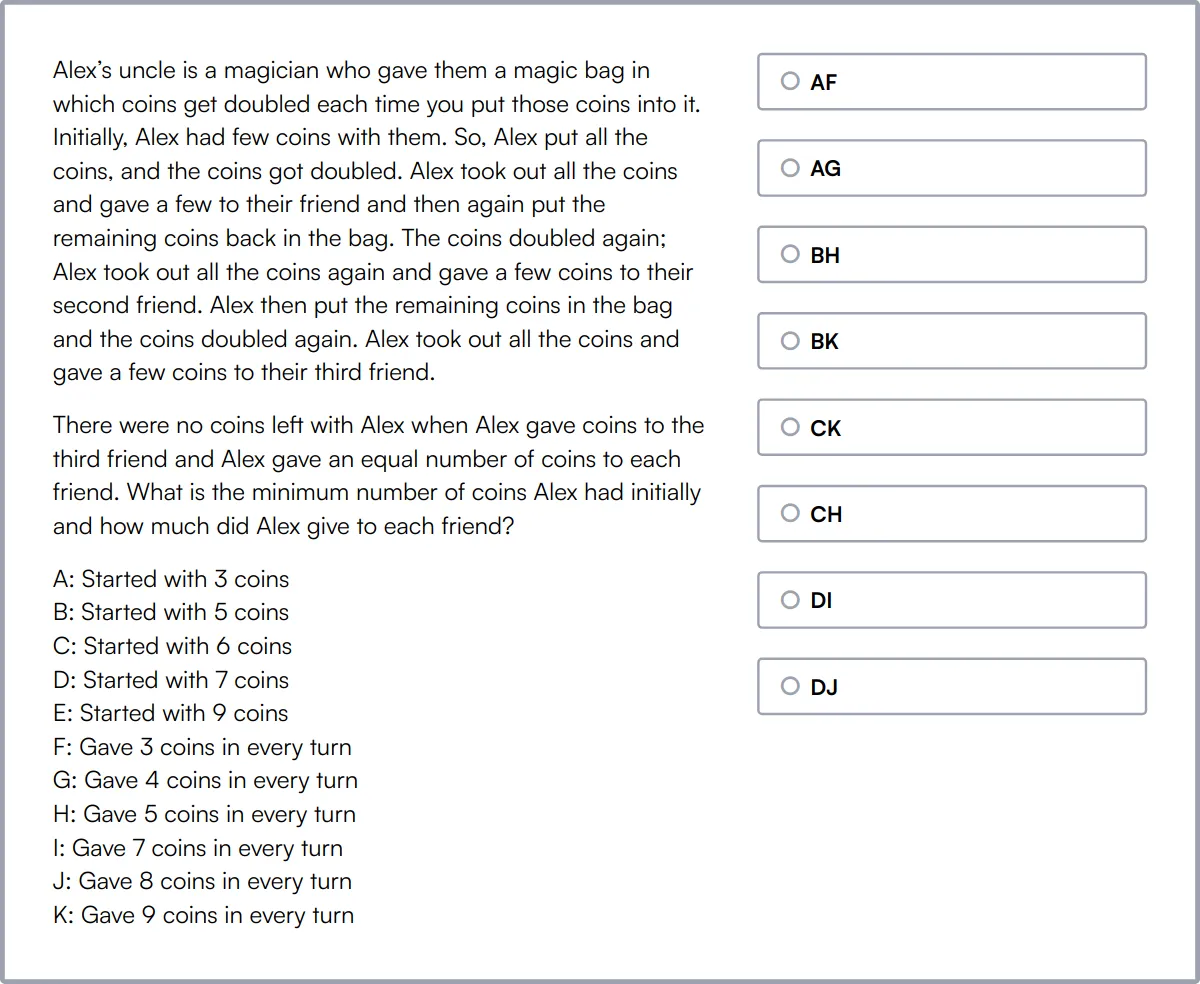
Attention To Detail Test
Our Attention to Detail Test evaluates a candidate's ability to focus on tasks and their willingness to be thorough for detail-oriented work.
The test assesses skills such as following instructions, verifying data, checking consistency, proof-reading, identifying mistakes, and detecting typos. Candidates are presented with multiple-choice questions that require careful attention to detail.
High-scoring candidates show a keen eye for detail, ensuring high-quality work and minimizing errors in data processing and documentation.
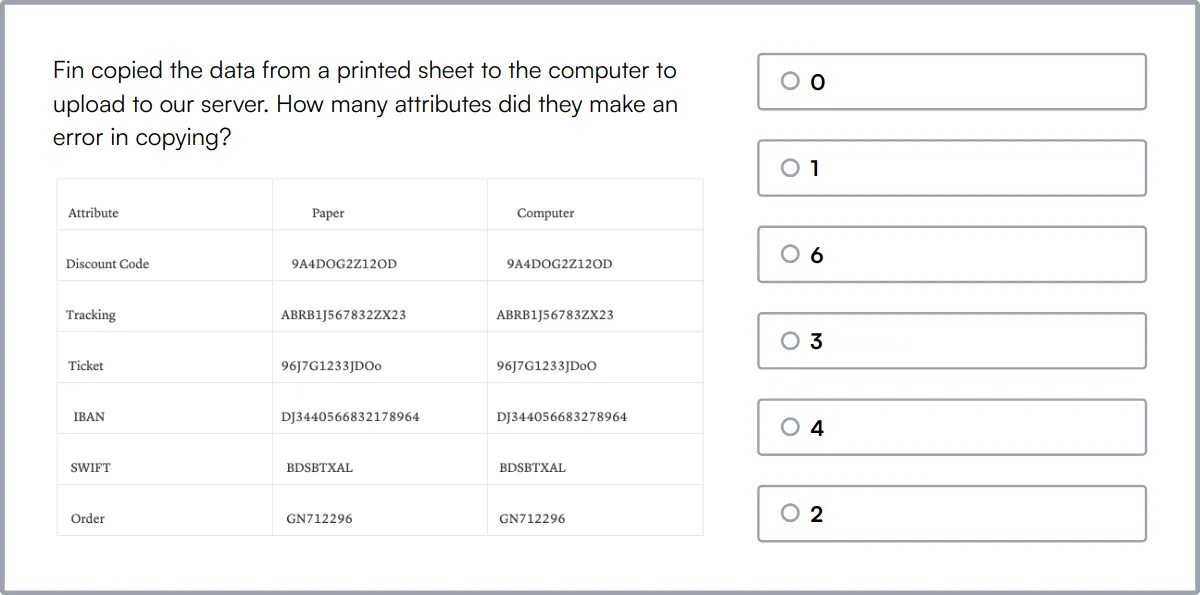
Technical Aptitude Test
Our Technical Aptitude Test uses scenario-based multiple-choice questions to evaluate a candidate's general technical aptitude and problem-solving skills.
The test covers programming fundamentals, data structures, algorithm basics, and technical aptitude. It includes questions on basic computer concepts, programming, data structures, time complexity, database management, networking, and security.
Candidates who perform well demonstrate a solid understanding of technical concepts and the ability to apply critical thinking and logical reasoning to solve complex technical problems.
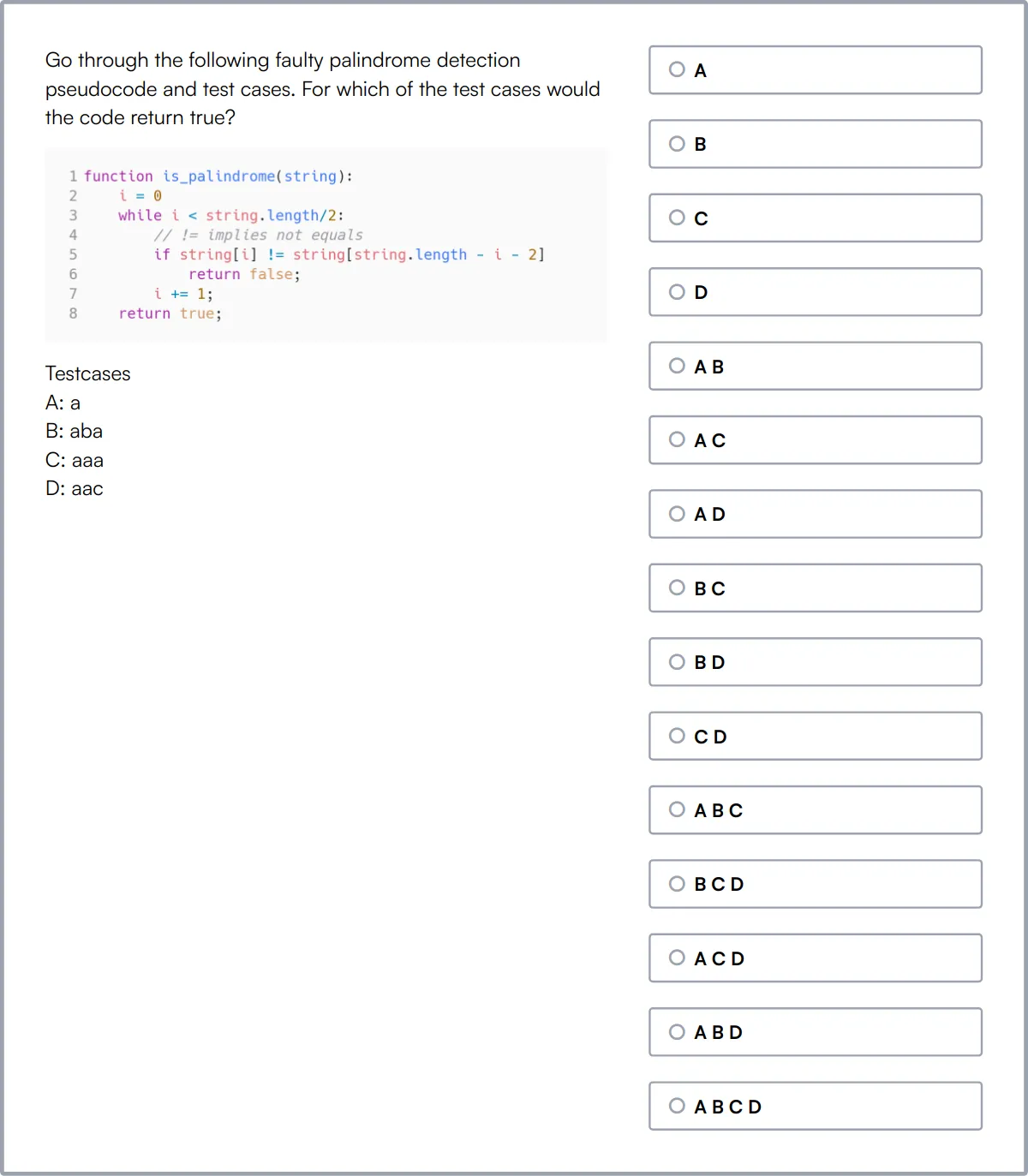
Problem Solving Test
Our Problem Solving Test evaluates a candidate's ability to understand instructions, analyze data, and respond to complex problems or situations.
The test assesses abstract reasoning, critical thinking, deductive reasoning, inductive reasoning, pattern matching, and spatial reasoning. Candidates are presented with questions that provide insights into their problem-solving abilities, learning agility, and coachability.
Successful candidates exhibit strong analytical skills and the ability to approach problems methodically, making them well-suited for roles that require innovative solutions and strategic thinking.
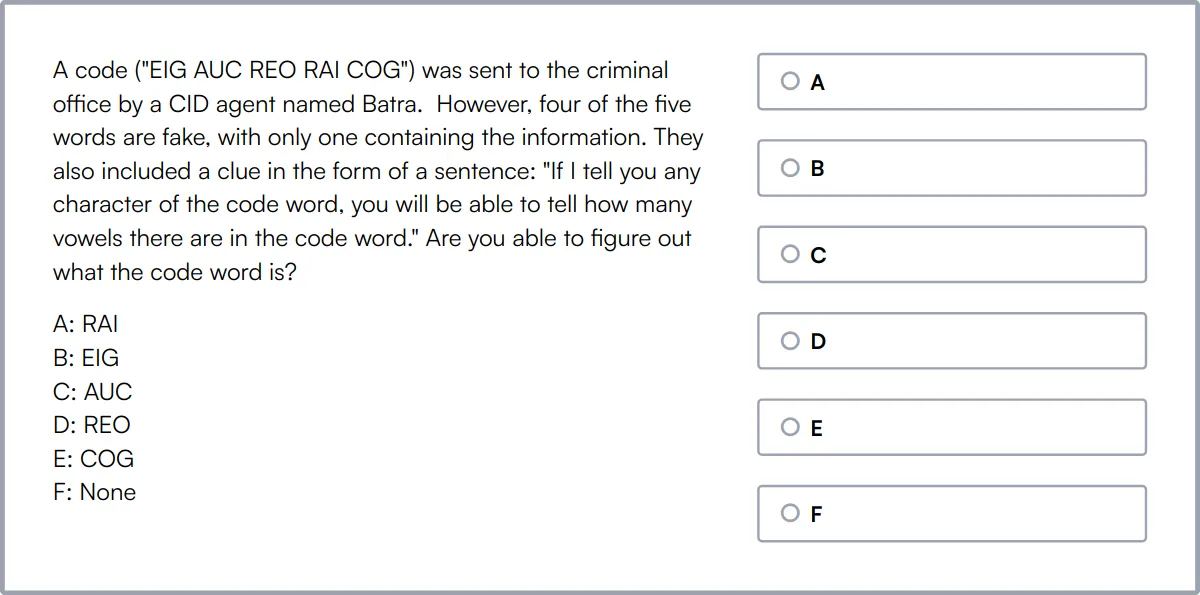
GDPR Online Test
Our GDPR Online Test uses scenario-based multiple-choice questions to evaluate candidates on their understanding of GDPR regulations and best practices for data protection and privacy.
The test covers data privacy, data protection, data security, data breach, data processing, consent management, data retention, data subject rights, data transfer, data controllers, and data processors. Candidates are assessed on their ability to identify and evaluate data protection risks and develop GDPR compliance policies.
Candidates who excel in this test demonstrate a thorough understanding of GDPR regulations and the ability to implement effective data protection strategies.
Data Analysis Test
Our Data Analysis Test assesses a candidate's ability to handle, modify, analyze, and interpret data.
The test covers data modelling, data analysis, business analysis fundamentals, data interpretation, data queries and databases (SQL), data operations, data investigations, and popular data tools (Excel). Candidates are evaluated through scenario-based questions on data analysis, business analysis, data interpretation, and SQL.
High-scoring candidates demonstrate proficiency in analyzing data to find outcomes, detect anomalies, extract insights, and visualize data using charts and graphs.

Summary: The 9 key Validation Engineer skills and how to test for them
| Validation Engineer skill | How to assess them |
|---|---|
| 1. Analytical Thinking | Evaluate how a candidate processes complex information to form logical conclusions. |
| 2. Attention to Detail | Assess precision in tasks through error-checking tests or meticulous project reviews. |
| 3. Technical Writing | Review clarity, coherence, and technical accuracy in written documents. |
| 4. Problem-Solving | Test ability to solve complex issues with practical, innovative solutions. |
| 5. Knowledge of Regulations | Verify understanding of industry-specific regulations through scenario-based questions. |
| 6. Data Analysis | Examine proficiency in interpreting datasets to derive meaningful insights. |
| 7. Software Proficiency | Check familiarity and skill level with relevant software tools. |
| 8. Project Management | Assess ability to plan, execute, and lead projects through case studies. |
| 9. Risk Assessment | Evaluate capability to identify and mitigate potential risks in scenarios. |
Informatica B2B Data Exchange Test
Validation Engineer skills FAQs
What skills are most important for a Validation Engineer?
Key skills include Analytical Thinking, Attention to Detail, Technical Writing, Problem-Solving, and Knowledge of Regulations. Proficiency in Data Analysis, Software, and Hardware are also important.
How can recruiters assess problem-solving skills in Validation Engineers?
Recruiters can assess problem-solving skills by presenting candidates with real-world scenarios related to validation tasks and asking them to outline their approach to solving these issues.
What role does software proficiency play in the Validation Engineer's job?
Software proficiency is crucial for designing, executing, and analyzing validation tests. Familiarity with specific industry software tools can streamline testing processes and improve accuracy.
Why is knowledge of regulations important for Validation Engineers?
Validation Engineers must ensure that products meet industry standards and government regulations. Understanding these requirements is key to conducting effective validations and maintaining compliance.
How can teamwork be assessed during the hiring process for a Validation Engineer?
Assess teamwork by discussing past projects with candidates, focusing on their role within the team. Group interviews or team-based assignments can also provide insight into their collaboration skills.
What is the importance of documentation skills in the Validation Engineering role?
Documentation is critical for recording test results, methodologies, and compliance with regulations. Strong documentation skills ensure that validations are traceable, reproducible, and up to regulatory standards.
How does project management ability impact a Validation Engineer's effectiveness?
Effective project management helps in planning, executing, and finalizing validation projects within the allotted time and budget, ensuring that all project milestones are met efficiently.
What types of risk assessments are crucial for Validation Engineers?
Validation Engineers should be skilled in identifying potential risks in product design and production processes. They must assess operational, financial, and compliance risks to mitigate potential issues.

40 min skill tests.
No trick questions.
Accurate shortlisting.
We make it easy for you to find the best candidates in your pipeline with a 40 min skills test.
Try for freeRelated posts
Free resources



